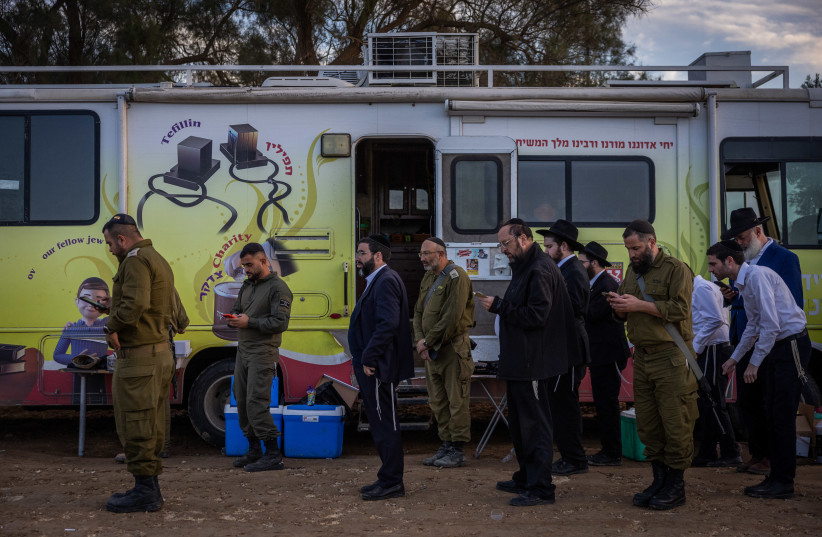The Foreign Affairs and Defense Committee and the IDF Human Resources Office convened last week to discuss the IDF's plan to encourage ultra-Orthodox recruitment into military service.
"There is a desire in the public to serve in the IDF at this time and to serve in various fields of activity. This is reflected beyond the fighting spirit itself, both in the matter of the establishment of a reserve service and in the desire of people who want to contribute,” stated MK Elazar Stern, the chairman of the committee.
“The goal of this discussion is for us to know where we really stand and above all to see how to strengthen the connections within Israeli society. In my eyes, the top step is service in the IDF combat units. We understand that things take time, but we need to see how we manage to preserve this spirit that pulsates in the nation and not return to the routine of those who carry the burden and those who have less."
Increase in ultra-Orthodox enlistment since October 7
The majority of the ultra-Orthodox community remains opposed to the draft, although there has been an increase in ultra-Orthodox enlistment since the October 7 massacre and outbreak of the war. Many others who did not enlist have aided the war effort by volunteering.
Planning and Personnel Administration Brigade Commander Brig.-Gen. Shay Taib stated: "The IDF has been busy with the issue of expanding the recruitment of the ultra-Orthodox since before the war, and we saw the desire for recruitment from the beginning of the war as an opportunity. We look at the needs on three levels - national need, quantitative need (a lot of fighters and soldiers are needed to maintain security), and qualitative need (potential of quality people who could contribute a lot to the IDF).”

“There are a wide variety of ultra-Orthodox recruitment routes - from routes without uniforms, including ultra-Orthodox women in volunteer settings, to the combat service. The most significant issue was exempted persons over the age of 26 who wanted to enlist. From the beginning of the war, we recruited about 450 ultra-Orthodox in the second phase track that existed, and 4 traineeships were done in these two months.
“Looking forward, we are working on establishing a second ultra-Orthodox battalion in reserve. In addition, a directorate was established to strengthen the ultra-Orthodox units in the army, and in the future, a dedicated officer will be appointed who will respond to ultra-Orthodox soldiers who wish to enlist in non-Orthodox units.
"This issue is very important. The situation is not good even compared to what was in the past and you have to ask why? We will put aside the political aspect, there is a social aspect and that is the most important. The IDF can do a better job,” said MK Moshe Tor Paz.
“When the IDF wants the ultra-Orthodox and makes an effort to absorb them and respect their way of life, it succeeds. Civil work is the key. The IDF does not know how to recruit ultra-Orthodox for itself, it owes the civilian world, the associations that will help it.”
Mothers against ultra-Orthodox IDF exemptions
While the IDF hopes to build on the small surge of ultra-Orthodox enlistment sparked by the war, there are concerns that integration of ultra-Orthodox into the army - and broader Israeli society - is not happening on a large enough scale.
On the opposite end of the spectrum, there are concerns within the ultra-Orthodox community that this surge in enlistment will open the floodgates and lead more ultra-Orthodox Jews to enlist in the future, potentially causing rifts in the religious sector.
Mothers of soldiers from the Mothers' Front movement said at the hearing that they petitioned the court to end “the legal torture that ultra-Orthodox society puts us through for political interests.”
The group added that the IDF itself should not be the one recruiting ultra-Orthodox, but the state. “We also have special needs, but no one asked the paratrooper battalion, which has not received a respite for many weeks. The ultra-orthodox society needs to understand the price of not enlisting."
"The average Israeli takes care of either his children, or his cousins, or his neighbors," MK Stern said after the discussion. "There is a population in the State of Israel that does not understand this. This cannot be underestimated."
